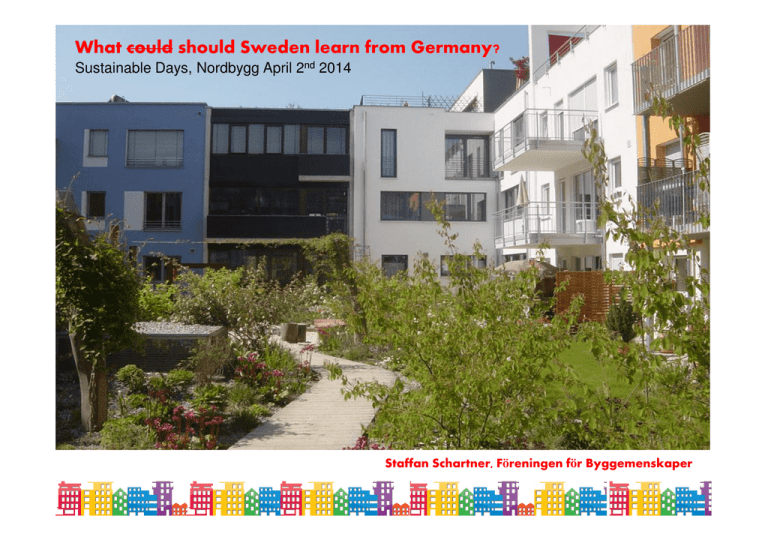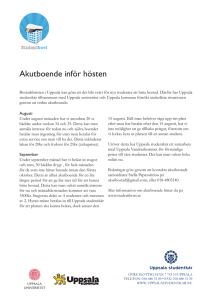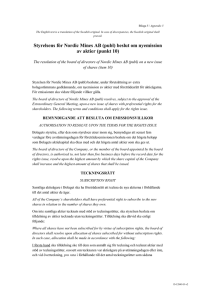Förening byggemenskaper Staffan Schartner
advertisement

What could should Sweden learn from Germany? Sustainable Days, Nordbygg April 2nd 2014 Stockholm 2012 10 23 – Staffan Schartner Staffan Schartner, Föreningen för Byggemenskaper I will present • a very brief historical review • some problems in Swedish residential construction • a comparison with German developments • the conclusion that Sweden need to de-industrialise • Swedish co-housing initiatives …but first an important definition BAUHERR = BYGGHERRE = BUILDER DEVELOPER CLIENT CONTRACTOR ”PRINCIPAL” Byggherre kallas enligt plan- och bygglagen (PBL) den som för egen räkning utför eller låter utföra byggnads-, rivnings- eller markarbeten genom en byggentreprenör eller byggmästare. …but first an important definition BAUHERR = BYGGHERRE = BUILDER DEVELOPER CLIENT CONTRACTOR ”PRINCIPAL” Byggherre kallas enligt plan- och bygglagen (PBL) den som för egen räkning utför eller låter utföra byggnads-, rivnings- eller markarbeten genom en byggentreprenör eller byggmästare. BAUMEISTER = BYGGMÄSTARE = (CONTRACTOR) Sweden: Changing focus in how to build Until middle of 19th Century Building for own needs 1870-1910 Workers live in slums Raw capitalism Charity projects 2nd half of 19th Century Speculation occurs Fairly small properties Private funds 1910-1945 Increasing state involvment. Standardisation Modernism! 1890-1930 Cooperatives occurs. Growing self reliance. 1975-1992 Backlash Low activity Continued subsidies 1945-1975 Public housing Subsidies Deep involvment Increasing scale Industry created 1918 1994-2014 No public involvment Housing commoditised Market oligopoly Few private initiatives Small production 1990 Tax reform 1991-94 Finacial crisis 1915 SKB, 1923 HSB 1850 1900 New homes in Stockholm 1900-2010 2015Set for a new turn to more diversity and a smaller scale in residential construction 1933 1944 1970 1992 2010 What went wrong in Sweden? GERMANY Deep public involvment in post-war housing. Growing industry and massiv destruction in the war requires large volumes of new homes SWEDEN Deep public involvment in post-war housing. Growing industry and migration requires large volumes of new homes 1945 Private initiative replaces step by step public housing. Medium size contractors in residential construction. Regional and local bodies responsible for much of legislation and subsidies Housing markets mainly in balance Huge number of private ”principals” Moderate costs, good quality Increased focus on social, ecological, spatial and economic sustainability Smaller scale and differentiated types of dwellings Forceful efforts towards industrialisation. Large scale projects , large corporations and prefabrication replaces craftsmen and traditional contractors Shortages and low production Large scale projects Small number of corporate ”principals” Very high costs, moderate quality Standardised buildings and apartments Money rules – no social considerations 1960 1980 2000 2015 So, here we are … - producing by far to few dwellings - using the existing stock of flats poorely - having high prices (and costs) - buying dull flats in uninspiring buildings - watching the government act in panic - seeing things get worse rather than better What should we do? Further industrialisation of the most industrialised construction sector? Many eyes are turned to Germany, but what is there to look for? I think Sweden should look at this: How come a Swedish contractor, who is not the largest developer in Sweden, can be (one of?) Germanys largest developer of new homes with a production smaller than it is in Sweden? How come 80% of German housing is produced with persons as principals, when 100% of projects in Stockholm are handled by 30 corporate developers? How come social, economic, ecological and spatial sustainability can be the driving force in German land allocation? How come engagement and smaller scale gives lower cost and better quality? AVINDUSTRIALISERA BOSTADSBYGGANDET In my opinion, Sweden has to de-industrialise the housing sector. Large scale, vertically integrated, profit-driven, anonymous corporations with a heavy overhead cost and expensive financing are not well suited to handle the most personal, site-dependent, complex, diverse and craftsmen dependent production there is - individual homes. Some quotes from the Frankfurter Allgemeine and Die Zeit ”Instead of a bidding, we now have a concept assesment. Idea beats the cheque book – what a message!” ”Land allocation on concept quality is mandatory. The better the social mix and the ambition in architecture, energy efficiency and mechanical installations, the better the chances” ”It is no coincidence that co-building projects work as role models” ”Many Germans are taking advantage of low interest rates to realize their dreams. Since cobuilding lower the cost, apartment buildings are gaining ground” On top of it – co0building ”Baugemeinschaften” In Tübingen, co-building is mainstream and the preferred way of handling new developments. (You just heard why) München is stating an official ambition of a 20-40% co-building share of public land allocation, Hamburg is more moderate with a stated goal of 20% - and special legislation for their subsidised financing. Many states and cities use tax-money to support the formation and success of co-building groups. How come? ”In co-building, people are creating urban devlopment instead of being its victims” Cord Soehlke Französisches Viertel, Tübingen Some co0building benefits Allows small scale (narrow properties) Different ambitions > huge variation! Very high involvment of ordinary citizens Social stability and consciousness Engagement for the neighbourhood Large variety in the types of dwellings High standards for sustainability Little economic speculation Long term persepctives Up to 30% lower costs for living Opportunity to fulfil special wishes Co0building in Sweden Byggemenskaper ”To most people, co0building does not exist as a concept” (but everyone think co0owning is the most normal thing) „Bostadsrätt“ bedeutet Baugenossenschaftswohnung und hatte seinen Ursprung darin, dass sich eine Baugemeinschaft zusammen fand um gemeinsam ein Gebäude oder eine Häuserzeile zu errichten und nach gemeinsamen Regeln und geteilten Kosten zu verwalten. Heute werden diese Baugenossenschaften überwiegend bereits von den Baugesellschaften gegründet, die dann den Anteils-Käufern die Regeln und Kosten gewissermaßen diktieren. „Bostadsrätt“ betyder „Baugenossenschaftswohnung“ och hade sitt ursprung i att en byggemenskap bildades för att tillsammans bygga ett eller flera hus samt efter gällande regler och med delade kostnader förvalta det. Nu för tiden bildas dessa Bostadsrättsföreningar oftast av byggbolagen, som då i viss utsträckning kann diktera villkoren och kostnaderna för andelsköparna. Herbert Kårlin i „Schweden-Aktuell“ Co0building in Sweden 2014 Sweden map ”In Stockholm we treat everyone the same way” The Stockholm property board controls about 70% of the land within the city borders: ”We treat co-building groups the same way as any other investor” ”We take into consideration the investors economy, stability and long-term interest” ”We also consider the investors track-record from previous projects” ”The investor will have to take all economic risk during the development of the zoning plan” The time between land allocation and start of the construction project is normally 5-8 years. The investors cost to handle this process can be SEK 0,5 – 1,5 M. In 2013, 50 properties with an average size of 102 dwellings were allocated to 25-30 different investors (some acting with sister companies). Four advices to facilitate non0industrial residential construction • Smaller properties • Planning before land allocation (”Detaljplan före markanvisning”) • Land allocation based on quality and sustainability (using market land values) • Payments as late as possible in the process ..but of course, cities can do much more! There is after all a strong trend towards a new urban development also in Sweden! Vallastaden, Linköping (Bo 17) ”Co-building is when private persons are forming a group and, based on their own ideas, as principal together plan, build and later use their building. W5 Planungsgesellschaft, Tübingen – free translation ”Vi älskar villan men vill bo i stan .” Foto: UrbanaVillor, Cord Siegel, Pontus Åqvist och Karin Larsson. ”Co-builders can have any type of driving force, and what they build can be anything . New or old, large or small, courageous or conventional. The defining aspect is that the persons who are going to use what is buing built together have the defining influence on what i being built. Chemnitzstrasse Hamburg Forms of organisation - Ägarlägenheter - Bostadsrättsförening - Kooperativ hyresrätt med eget fastighetsägande (bolag eller förening) - Kooperativ hyresrätt med blockförhyrning - Konventionell hyresrätt med eget hel- eller delägt fastighetsbolag Byggemenskaper thank you for listening! Staffan Schartner - 070 850 88 55 - staffan.schartner@omniplan.se Varför bygger byggemenskaper billigare? SEK/m2 Det här är allmänt bekant: Ju mindre projekt, desto högre kostnad per m2. m2 Varför bygger byggemenskaper billigare? SEK/m2 Psilander (KTH) Byggindustrin Lokala byggare Men i verkligheten visar forskningen lägre m2-kostnader för mindre projekt. m2 Varför bygger byggemenskaper billigare? 80000 70000 60000 50000 Vinst + risk 40000 Byggnad 30000 Mark 20000 10000 0 Byggbolag Byggemenskap Varför kan byggemenskaper bygga där andra inte kan? 35000 30000 Marknadspris 25000 20000 Vinst + risk 15000 Byggnad Mark 10000 5000 0 Byggbolag Byggemenskap Varför kan byggemenskaper bygga där andra inte kan? 35000 Egen finansiering 30000 25000 Marknadspris 20000 Vinst + risk 15000 Byggnad Mark 10000 BankFinansiering 75% 5000 0 Byggbolag Byggemenskap Föreningen har till ändamål att verka för byggemenskaper som organisationsform i nyoch ombyggnadsprojekt genom att: •- samla, utveckla och förmedla kunskap om byggemenskaper och vara en plattform för alla med intresse för byggemenskapens idé • stödja och underlätta bildandet av byggemenskaper och genomförandet av deras byggnadsprojekt. Interaktiv hemsida (delfinansiering Delegationen för hållbara städer) -Kunskapsbas - Interaktiv portal ”Match-making” - Formera byggemenskaper - Hitta tomter - Hitta konsulter, kreditgivare m fl Sammanförande av lokala initiativ och projekt Konferenser och seminarier Studieresor Samarbeten Kommande evenemang: Onsdag 2 april Nordbygg / Sustainable Days Cord Soehlke, borgmästare i Tübingen Lördag/söndag 5-6 april Vårkonferens i Göteborg Studiebesök Brännö Torsdag-lördag 8-10 maj Studieresa till Tübingen och Freiburg Maj Kommunnätverksmöte i Stockholmsregionen

